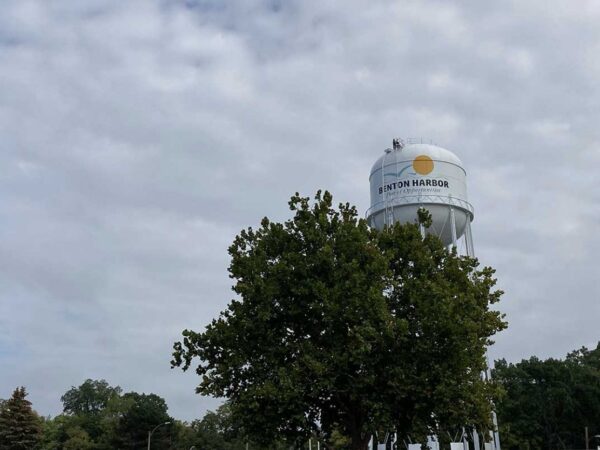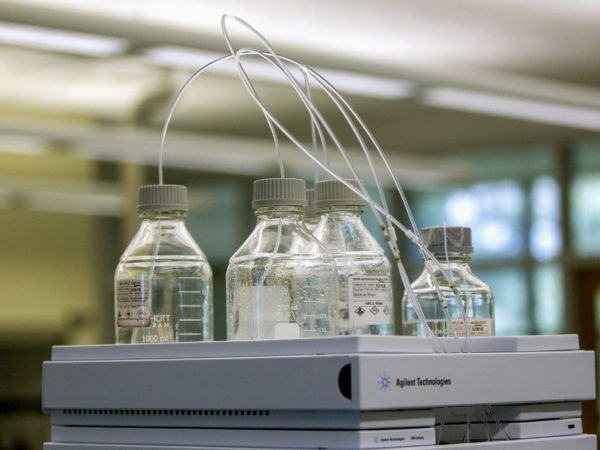
By Lindsey Smith, Michigan Radio
The Great Lakes News Collaborative includes Bridge Michigan; Circle of Blue; Great Lakes Now at Detroit Public Television; and Michigan Radio, Michigan’s NPR News Leader; who work together to bring audiences news and information about the impact of climate change, pollution, and aging infrastructure on the Great Lakes and drinking water. This independent journalism is supported by the Charles Stewart Mott Foundation. Find all the work HERE.
Update 12/29/21: Benton Harbor city commissioners voted to spend up to $1 million in federal money to help cover water bills. At a meeting last week, Mayor Marcus Muhammad said the credits would help anyone with an active water account, whether they’re past due or not. The money comes from coronavirus relief funding in the American Rescue Plan Act. It wasn’t clear what portion of an individual’s bill would be covered or for how long. Muhammad said he’d continue to push state lawmakers and other state government officials to use state money to also provide water bill relief.
It’s been two months since state health officials warned the 9,000 people living in Benton Harbor not to drink their water. Don’t cook with tap water, or rinse your food with it, or brush your teeth with it — definitely don’t use it to mix baby formula — because of the potential risk of lead exposure. There is no safe level of lead in drinking water.
Residents Joddie and Lavern Williams have cases of bottled water stacked up in rows in their basement.
“Are you serious!?” Lavern William recalls reacting when she got a bill after being warned not to consume the water. She said they have continued to pay their water bill but heard there may be compensation coming. But under a new pilot program, it’s unlikely they’ll qualify for state relief money.
Tywona Palmer feels the same way. She serves as secretary on Benton Harbor’s Water Advisory Council, a local group that’s asked the EPA to take emergency action in the city. Palmer and her two teenagers rent a 3-bedroom home. She estimates her monthly bills are between $100 and $200.
“Bills are entirely too high for us to not be able to use the water. And it just seems like each month it was just going up, so what are we paying for? Because you barely want to wash your hair or put your skin in it,” Palmer said.
Like the Williamses, Palmer has continued making payments for water her family can’t consume.
“That is the greatest cry at this time,” Mayor Marcus Muhammad said of the demand for water bill credits, now that free bottled water has been readily available.
“For them to have to pay a full bill is an injustice,” Muhammad said.
Relief is coming for a limited time and for a limited number of Benton Harbor residents. This month, Michigan’s Department of Health and Human Services sent $151,953 to 237 eligible accounts as part of a pilot program.
Those who were eligible for the one-time payment had to meet these criteria:
- Be a residential account.
- Be in arrears or disconnect status.
- Have an income under 150% of the federal poverty line ($25,860 for a family of two) and/or be receiving assistance from certain state and federal programs, including:
- Temporary Assistance for Needy Families (TANF)
- Food Assistance Program/Supplemental Nutrition Assistance Program (FAP/SNAP)
- State Emergency Relief (SER)
- Social Security Supplemental Income (SSI)
Residents did not need to do anything to apply for the assistance. If they qualify, the credit should appear on their December bill. A health department spokesperson said people who don’t receive this relief on their water bill won’t have a formal way to appeal. People with questions or who want more information should call 2-1-1 for help.
Water rates in Benton Harbor are a little above average, but still unaffordable for many.
Lavern and Joddie Williams moved into their two-bedroom home on a quiet street in Benton Harbor in 2009. When they bought the place, she said, they paid between $40 and $60 a month for her water and sewer bill.
“Then around 2010, 2011, it went up to $140 a month, and there’s nobody here but us two,” Williams said.
That big spike happened when a state-appointed emergency manager was trying to fix the city government’s finances. Bills on average jumped by at least 40% in one year.
Rates have gone up since then to maintain the aging water distribution system and because there are fewer people remaining in the city to share the costs.
Benton Harbor’s population fell more than 9% in the last decade. Not only are fewer people living in the city, but neighboring communities have built their own water systems, leaving Benton Harbor with an oversized water system for its dwindling population.
“Only time we use the water is to bathe and to cook,” Joddie Williams said.
“Well not even to cook now, it’s crazy,” Lavern Williams interrupted.
“Water the grass maybe, wash the car,” Joddie added, thinking out loud. “We ain’t used the water, no not this summer, cause I ain’t watered the grass.”
A University of Michigan study done just a few years ago on water affordability in the city showed:
- Most residents paid between $80 and $160 per month for their water.
- Average water bills in Benton Harbor are lower than rates in Detroit and Flint.
- Because household incomes in Benton Harbor are so low, high water bills have a much bigger impact on people’s finances than they do in Detroit, Flint, and especially the average Michigander.
- 70% of people living in Benton Harbor were “very concerned” or “extremely concerned” about being able to afford their ever-increasing water bills.
What about residents who aren’t past due. Will they get compensated eventually?
In 2016, the Michigan Legislature voted unanimously to have the state help cover the cost of water bills in Flint.
“I agree with Flint residents, that they should not have to pay for water they cannot drink,” then-Gov. Rick Snyder said in February of 2016.
Michigan paid 65% of every residential water bill in Flint, retroactive to when the city switched water sources, in April 2014. Businesses got 20% off.
The state ended up extending the credits through March of 2017, spending a total of $41 million on water credits for some 21,000 water customers in a community of 99,000 residents.
In Benton Harbor, lead levels have been elevated in drinking water since 2018. Benton Harbor has the longest-running lead in water exceedance in Michigan history, surpassing the length of Flint’s elevated lead levels by more than a year.
Last week the state announced lead levels in Benton Harbor were improving slightly, but are still elevated. The EPA and state health officials expect to release a more comprehensive study to figure out if water filters work on Benton Harbor’s water.
“In the meantime and between time while… you can’t drink (tap water), you can’t brush your teeth, you can’t cook, water credits need to be given out until that’s lifted. That’s justice,” Mayor Marcus Muhammad said.
Ultimately, the amount of money in the latest pilot program for Benton Harbor is nowhere near the financial relief the state offered Flint residents on bills between 2014 and 2017. But it’s not clear if there’s the political will on the part of the Michigan Legislature or other elected officials to spend money on water bills in Benton Harbor.
“I would like to see Representative (Pauline) Wendzel and State Senator (Kim) LaSata to step up to the plate and advocate on behalf of residents of Benton Harbor to get water credits,” Muhammad said.
Twenty-two state lawmakers who voted to send state money to cover water bills in Flint are still in office today. When asked if they’d be willing to do the same for Benton Harbor residents, none of them responded. Neither did Governor Gretchen Whitmer’s office, nor Wendzel or LaSata.
In an interview late last month, MDHHS Director Elizabeth Hertel said she was not aware of anyone talking about covering a portion of water bills while the water is unsafe to drink.
“We still do want them to be using their water for bathing, cleaning around the home and that sort of thing, so they still can use the water for other things,” Hertel said.
“We are doing everything we can in that community to support those residents until they get those lead service lines replaced,” she added.
Residents can get information on water pickups and deliveries on the state’s website.
People or groups who want to serve as unpaid volunteers to help people in Benton Harbor can sign up on the United Way’s online platform.
Catch more news on Great Lakes Now:
High costs, few customers: Benton Harbor water woes loom for Michigan cities
Tests show lead in Benton Harbor tap water finally dropping
Featured image: Safe Water Engineering’s Elin Betanzo shows Lavern and Joddie Williams a lead pipe in November 2021, after testing the water in the couple’s home. (Photo Credit: Lindsey Smith/Michigan Radio)




